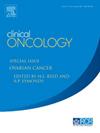Real World Multi-centre UK Review of Nivolumab Monotherapy in Metastatic Endometrial Cancer With Mismatch Repair Deficiency During COVID-19
IF 3
3区 医学
Q2 ONCOLOGY
引用次数: 0
Abstract
Introduction
Immunotherapy checkpoint inhibition has shown improvement in efficacy and survival in patients with mismatch repair deficient (MMRd) advanced endometrial cancer (mEC) compared to chemotherapy. This is combined with chemotherapy in the first-line setting or as monotherapy in later lines of therapy.
Objective
To assess the efficacy, survival and toxicity of nivolumab monotherapy in metastatic endometrial cancer (mEC) in both first and later lines of therapy as used in the NICE COVID-19 systemic anti-cancer (SACT) guidelines.
Methods
A multi-centre retrospective review of mEC patients with associated MMRd who received nivolumab as per NICE COVID NG161 at 10 NHS cancer centres. Patient demographics, molecular classification and previous treatments were recorded in addition to treatment responses, duration of response, overall survival, progression-free survival and toxicities. Kaplan-Meier curves analyse the survival data.
Results
52 patients were identified. Median age was 67 (37–81) years. 87.5% of patients had endometrioid histology and 75% were oestrogen receptor (ER) positive. 10.4% patients were p53 mutated. 33.3% of mEC patients were stage IV at diagnosis.
30 (62.5%) patients received nivolumab as first-line mEC therapy. 33 (68.8%) patients received nivolumab 4-weekly. Treatment response was clinician-observed in 34 (70.8%) patients, with 7 (14.5%) more having stable disease.
52%, 45% and 36% of patients were progression-free at 12, 18 and 24months, respectively. 75%, 55% and 47% of patients were alive at 12, 18 and 24 months.
There was no significant difference between survival or response whether nivolumab was given in the first line or subsequent lines.
29 (60.4%) patients have discontinued treatment with 23 (44.2%) being due to progressive disease or death. 18 (37.5%) patients developed G1-2 toxicity, and 3 (6.25%) patients discontinued due to G3 toxicity.
Conclusions
This retrospective cohort shows that nivolumab monotherapy has good real-world disease control of mEC patients with MMR deficiency. Toxicity rates were low, and checkpoint monotherapy may be a viable option for selected first-line MMRd mEC patients.
英国对Nivolumab单药治疗COVID-19期间错配修复缺陷的转移性子宫内膜癌的真实世界多中心综述
与化疗相比,免疫治疗检查点抑制在错配修复缺陷(MMRd)晚期子宫内膜癌(mEC)患者中的疗效和生存率有所提高。这是在一线环境中与化疗联合,或在后期的治疗中作为单一疗法。目的评估nivolumab单药治疗转移性子宫内膜癌(mEC)在NICE COVID-19系统性抗癌(SACT)指南中使用的一线和二线治疗中的疗效、生存期和毒性。方法对10个NHS癌症中心根据NICE COVID NG161接受纳武单抗治疗的mEC相关MMRd患者进行多中心回顾性分析。除了治疗反应、反应持续时间、总生存期、无进展生存期和毒性外,还记录了患者人口统计学、分子分类和既往治疗。Kaplan-Meier曲线分析生存数据。结果共鉴定出52例。中位年龄为67(37-81)岁。87.5%的患者有子宫内膜样组织学,75%的患者雌激素受体(ER)阳性。10.4%的患者p53发生突变。33.3%的mEC患者在诊断时为IV期(62.5%)患者接受纳武单抗作为一线mEC治疗。33例(68.8%)患者接受每周一次的纳武单抗治疗。34例(70.8%)患者临床观察到治疗反应,7例(14.5%)患者病情稳定。52%、45%和36%的患者分别在12个月、18个月和24个月无进展。75%、55%和47%的患者在12、18和24个月时存活。在一线或后续治疗中给予纳武单抗,生存率或疗效无显著差异(60.4%)患者停止治疗,其中23例(44.2%)是由于疾病进展或死亡。18例(37.5%)患者出现G1-2毒性,3例(6.25%)患者因G3毒性停药。结论本回顾性队列研究表明,纳武单抗单药治疗对MMR缺乏症mEC患者具有良好的现实世界疾病控制效果。毒性率低,检查点单药治疗可能是选定一线MMRd mEC患者的可行选择。
本文章由计算机程序翻译,如有差异,请以英文原文为准。
求助全文
约1分钟内获得全文
求助全文
来源期刊

Clinical oncology
医学-肿瘤学
CiteScore
5.20
自引率
8.80%
发文量
332
审稿时长
40 days
期刊介绍:
Clinical Oncology is an International cancer journal covering all aspects of the clinical management of cancer patients, reflecting a multidisciplinary approach to therapy. Papers, editorials and reviews are published on all types of malignant disease embracing, pathology, diagnosis and treatment, including radiotherapy, chemotherapy, surgery, combined modality treatment and palliative care. Research and review papers covering epidemiology, radiobiology, radiation physics, tumour biology, and immunology are also published, together with letters to the editor, case reports and book reviews.
 求助内容:
求助内容: 应助结果提醒方式:
应助结果提醒方式:


